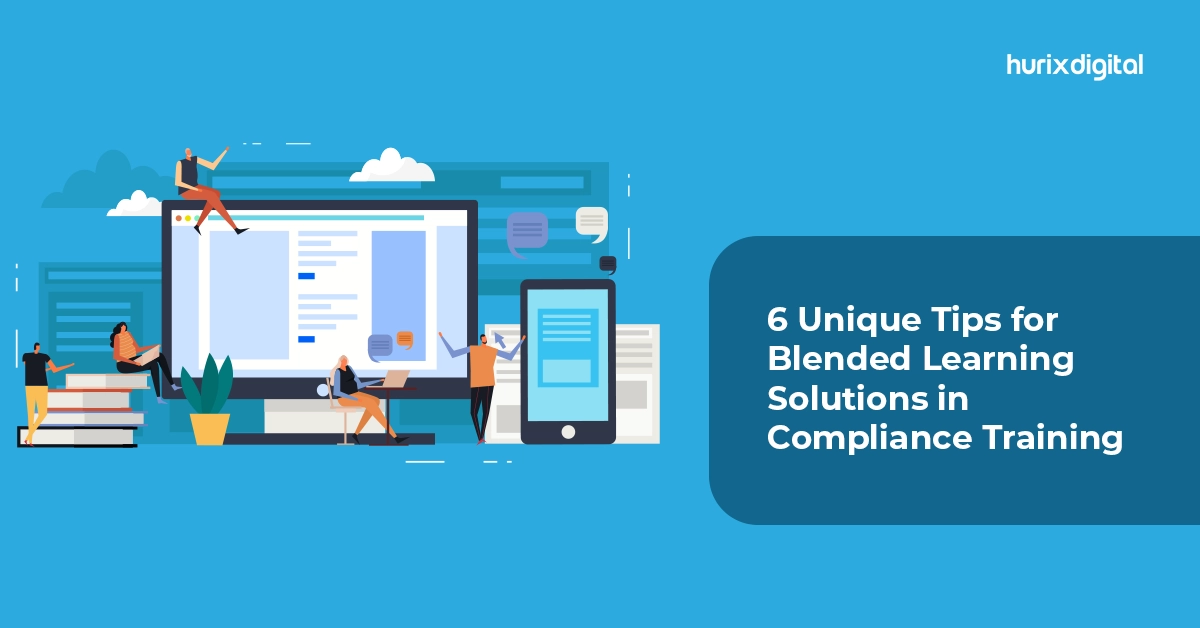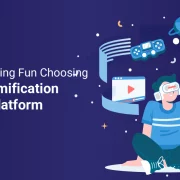
6 Unique Tips for Blended Learning Solutions in Compliance Training
Summary
This blog offers unique tips for implementing blended learning solutions in compliance training. Learn how to combine different learning methods for effective training.
Compliance training is one of those corporate challenges that need quite a push from the employer’s end for completion. It is almost as if a natural reaction from the employees to avoid them.
And yet, can you entirely blame them? Tedious graphics with a forlorn string of unending information about dos and don’ts offered without any creativity or interactive elements often make corporate training boring for the employees to attend.
But thanks to blended learning solutions. With the right instructional design for compliance, combined with advanced blended learning techniques and eLearning strategies, learning and development have become much easier today in the corporate world.
Did you know: as per McKinsey, the global e-learning industry accelerated by 92% YoY growth in 2020 due to COVID-19 and is expected to reach $465 billion by 2028.
In this blog, we will see how these hybrid training approaches can make compliance training much more interesting and attractive. We will briefly learn about what blended learning is and some useful tips for blended learning solutions in compliance training.
Table of Contents:
What is Blended Learning?
Blended Learning, also known as hybrid learning, is a combination of new-age e-learning and traditional face-to-face learning. It takes learning outside the concretes of a classroom and makes it accessible across the world. It benefits both types of learners, — those who prefer classroom-based learning, as well as those who learn best with computer-based learning.
There are many types of blended learning styles available in this digital era. Some of the common blended learning examples are flipped classrooms, flex models, personalized learning, game-based learning, enriched virtual learning, etc.
Also Read: Lost in Lingo? Top 10 L&D Jargon Terms Emerging Professionals Should Know
Tips for Blended Learning Solutions in Compliance Training
Blended learning has come as fresh air to mundane corporate training. But just implementing any blended learning training is not going to help much unless you give a structured thought process behind it.
In this section, let us look at some tips and strategies that you must keep in mind while designing the compliance training module.
1. Know Your Employees
First things first, — know your target audience. Before designing your e-learning compliance training, understand your audience.
You may take surveys to know their level of existing grasp on the subject (beginners, good or advanced), their educational qualification, demographics, etc. Based on this information, the developer can now implement the most relatable and effective strategies to design the course.
For instance, if your employees already have a good understanding of the content, you should not waste time by giving them beginner-level training. It will lead to not only a lengthy training but also will bore your employees.
2. Concise & Engaging Content Creation
To avoid unnecessarily lengthening your content, be specific about what you want to include in your training program. You may break them down into smaller topics and check if there is any content that is repetitive or can be eliminated.
For example, give special focus on including the most misunderstood pieces of information that can lead to the highest risks. Use proper graphics to describe the magnanimity of the impact it can cause due to non-compliance. Nobody likes to make serious mistakes knowingly. It should keep their attention pinned.
3. Design the Gameplan
Once you have decided what to include and what not in your content, now it is time to design the e-learning strategy. There are several ways one can design learning content, e.g., instruction-led learning, story-based learning, game-based learning, case studies, etc.
Fun and engaging elements can help draw the attention of the learners and make the training more interesting and interactive. You may segregate the content and assign each segment a particular learning style.
4. Implement the Right Technologies
Select the right technological tools and platforms for your blended learning compliance training. With the right learning management systems, interactive media, or instruction-led content, you can deliver a whole new experience for the learners.
Technology can make the training more interactive and engaging. But make sure the technologies are responsive. That is, they are compatible with all types of devices. Also, ensure that proper support and maintenance are available.
5. Create the Storyboard
Now that you have consolidated the content, learning style, as well as technologies, it is time to create the storyboard. It can be considered as the blueprint of the training module.
Here, you choose how the text, images, videos, etc., are presented, page by page. The developers usually use this blueprint to develop the e-learning compliance training module.
6. Testing, Feedback, and Implementation
Once the module is created, make trial runs of it in a focused group. Continue to evaluate the effectiveness of the course through constant feedback from the learner’s group. Make the necessary adjustments in the content as per the feedback to keep your learners engaged and interested.
Roll out the training program to your employees. Provide them with the necessary IT support and facilitators. Promote it internally to encourage participation. You may want to implement metrics to measure the training’s success, like knowledge gained, learner satisfaction, etc. You can use these data to further improve your blended learning training program.
Also Read: Best Practices for Translating and Localizing Workforce Learning Content
To Sum Up
Compliance training has been made much more interesting and attractive for the employees with the help of this carefully balanced, blended learning solution. It takes the nectar from both, traditional learning as well as more contemporary tech-based learning.
Employers now have plenty of options on how to design the training. They can choose from many e-learning modules, technologies, and learning styles while designing compliance training.
So, if you are looking for a blended learning solution provider for your company’s compliance training or any other form of training, you are on the right page. Hurix Digital comes with vast experience in designing and delivering effective blended learning solutions for several corporates across the world.
We offer a range of tools and technologies, including learning management systems, authoring tools, virtual classroom software, etc, for you to select from based on your particular requirements.
So connect with us and meet your training needs comfortably.

Performance, Results, Growth, and Life-Long Learning define my professional life. I am passionate about making workplace learning planful, purposeful, and impactful. I take pride in partnering with clients and bringing them the best in learning design and creating solutions that address business challenges.







